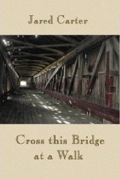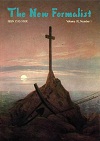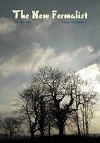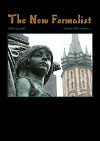The Making of a Poet
In every herd there is some restive steer
Who leaps the cows and heads each hot stampede,
Till the old bulls unite in jealous fear
To hunt him from the pastures where they feed.
Lost in the night he hears the jungles crash
And desperately, lest his courage fail,
Across his hollow flanks with sounding lash
Scourges the heavy whipcord of his tail.
Far from the phalanxes of horns that ward
The sleeping herds he keeps the wolf at bay,
At nightfall by the slinking leopard spoored,
And goaded by the fly-swarm through the day.
The Zebras
From the dark woods that breathe of fallen showers,
Harnessed with level rays in golden reins,
The zebras draw the dawn across the plains
Wading knee-deep among the scarlet flowers.
The sunlight, zithering their flanks with fire,
Flashes between the shadows as they pass
Barred with electric tremors through the grass
Like wind along the gold strings of a lyre.
Into the flushed air snorting rosy plumes
That smoulder round their feet in drifting fumes,
With dove-like voices call the distant fillies,
While round the herd the stallion wheels his flight,
Engine of beauty volted with delight
To roll his mare among the trampled lilies.
The Sisters
After hot loveless nights, when cold winds stream
Sprinkling the frost and dew, before the light,
Bored with the foolish things that girls must dream
Because their beds are empty of delight,
Two sisters rise and strip. Out from the night
Their horses run to their low-whistled pleas—
Vast phantom shapes with eyeballs rolling white,
That sneeze a fiery stream about their knees:
Through the crisp manes their stealthy prowling hands,
Stronger than curbs, in slow caresses rove,
They gallop down across the milk-white sands
And wade far out into the sleeping cove:
The frost stings sweetly with a burning kiss
As intimate as love, as cold as death:
Their lips, whereon delicious tremours hiss
Fume with the ghostly pollen of their breath.
Far out on the grey silence of the flood
They watch the dawn in smouldering gyres expand
Beyond them: and the day burns through their blood
Like a white candle through a shuttered hand.
Mass at Dawn
I dropped my sail and dried my dripping seines
Where the white quay is chequered by cool planes
In whose great branches, always out of sight,
The nightingales are singing day and night.
Though all was grey beneath the moon’s grey beam,
My boat in her new paint shone like a bride,
And silver in my baskets shone the bream:
My arms were tired and I was heavy-eyed,
But when with food and drink, at morning-light,
The children met me at the water-side,
Never was wine so red or bread so white.
Autumn
I love to see, when leaves depart,
The clear anatomy arrive,
Winter, the paragon of art,
That kills all forms of life and feeling
Save what is pure and will survive.
Already now the clanging chains
Of geese are harnessed to the moon:
Stripped are the great sun-clouding planes;
And the dark pines, their own revealing,
Let in the needles of the noon.
Strained by the gale the olives whiten
Lke hoary wrestlers bent with toil
And, with the vines, their branches lighten
To brim our vats where summer lingers
In the red froth and sun-gold oil.
Soon on our hearth's reviving pyre
Their rotted stems will crumble up:
And like a ruby, panting fire,
The grape will redden on your fingers
Through the lit crystal of the cup.



